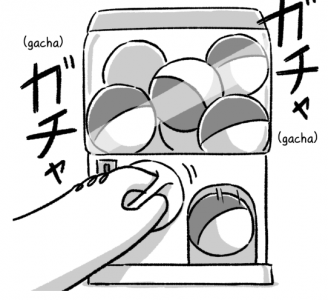
Gatcha games, are video games that implement the gacha machine mechanic. The term ‘gatcha’ comes from the Japanese onomatopoeia for the sound a capsule toy machine makes. In gatcha games, players spend in-game currency to “pull” a reward, often in the form of collectable characters, cards, or other items. Although in-game currency can generally be gained from game play, gatcha games have been criticized for being especially addictive as players are incentivized to spend real-world money to have a chance at pulling their desired reward.
As the results can never be guaranteed in its roulette-like mechanism, gatcha games are essentially games of luck, and players have found that the odds are usually stacked against them. After all, the more premium the character or item, usually the less chance there is for one to successfully pull it. In fact, it is precisely the rarity of an item that makes it so dearly sought after. Moreover, although most players say that they did not intend on spending money on the game when they first starting playing, they soon came to realize that it was hard to get the ‘good’ rewards without spending actual money.

Despite its foreign sounding name, the gacha game model is actually a worldwide phenomenon, and we can find this kind of gaming medium in western games as well. For instance, FIFA Ultimate Team has a game mode which allows players to purchase packs that include random selections of players and collectibles. Meanwhile in 2022, the action role-playing game Genshin Impact has approximately 50 million players playing the game — on a monthly basis. The game is so popular that it is now hosting its own conventions on a tour, in various nations around the world, with five conventions happening in just US alone in their 2022 tour.
One of the biggest debates surrounding gatcha games right now is whether they constitute a form of virtual gambling. Proponents of this theory argue that the use of artificial currency makes the transactions feel less real, therefore encouraging players to spend more than they would using real money. Opponents of this theory argue that the purchase of virtual currency cannot be considered a random outcome, because the players are getting exactly the same amount of virtual currency they are paying for. From a legal perspective, the players are rightfully getting a known quantity of virtual currency as “consideration” for their money. Moreover, some developers and players have contended that they are not paying for the gatcha roll itself, but merely the service provided by gatcha games with their joyous light and sound effects, which contributes to their gameplay enjoyment.
What is your take on the debate, and do you have any personal experiences with gatcha games yourself?
Sources:
https://thewokesalaryman.com/2022/07/26/what-being-addicted-to-gacha-games-taught-me/
 Communications Law
Communications Law